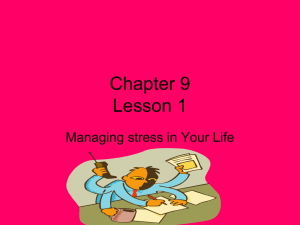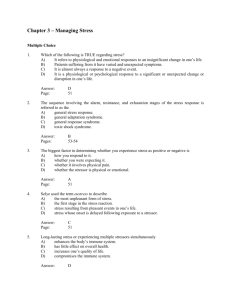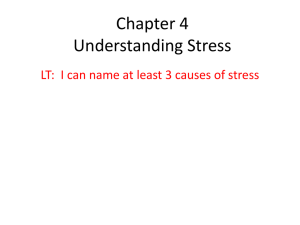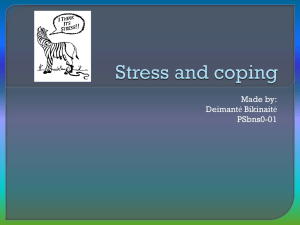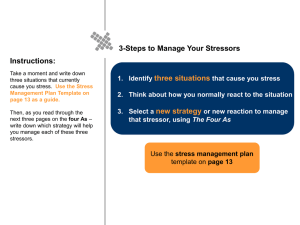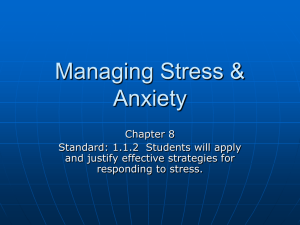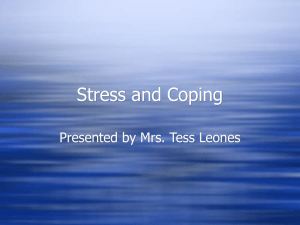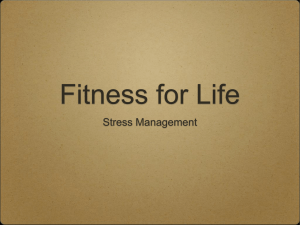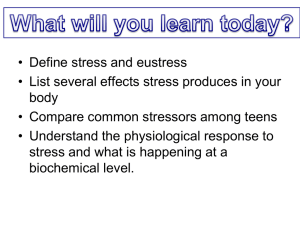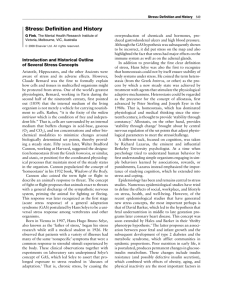Stress Management Test: Multiple Choice Questions
advertisement
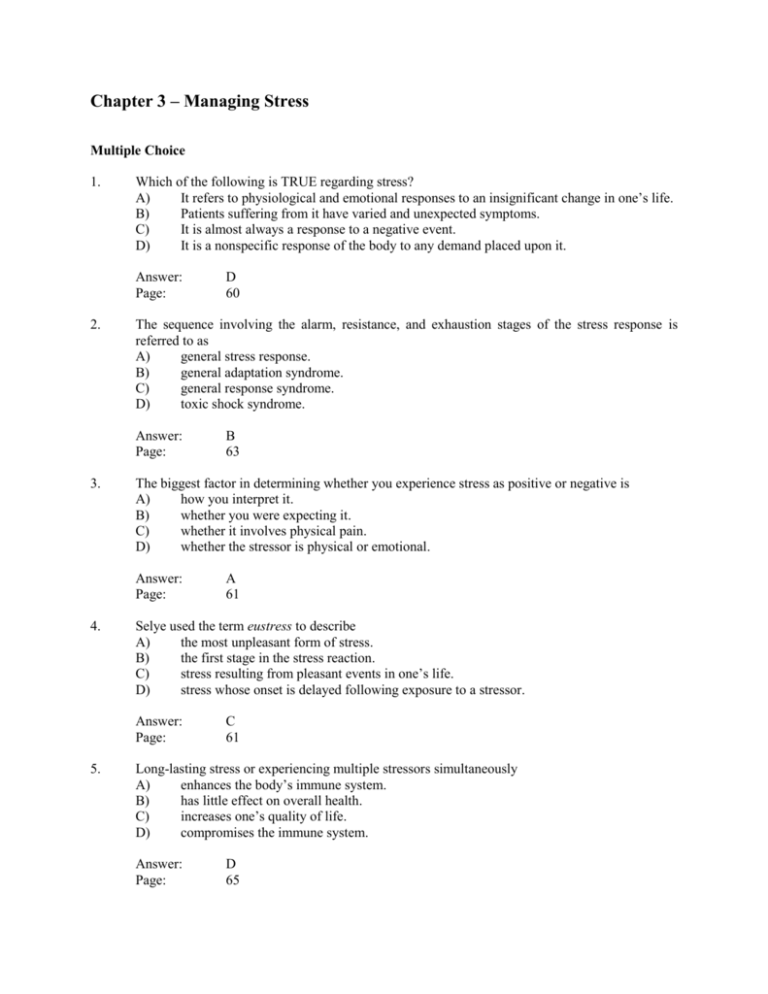
Chapter 3 – Managing Stress Multiple Choice 1. Which of the following is TRUE regarding stress? A) It refers to physiological and emotional responses to an insignificant change in one’s life. B) Patients suffering from it have varied and unexpected symptoms. C) It is almost always a response to a negative event. D) It is a nonspecific response of the body to any demand placed upon it. Answer: Page: 2. The sequence involving the alarm, resistance, and exhaustion stages of the stress response is referred to as A) general stress response. B) general adaptation syndrome. C) general response syndrome. D) toxic shock syndrome. Answer: Page: 3. A 61 Selye used the term eustress to describe A) the most unpleasant form of stress. B) the first stage in the stress reaction. C) stress resulting from pleasant events in one’s life. D) stress whose onset is delayed following exposure to a stressor. Answer: Page: 5. B 63 The biggest factor in determining whether you experience stress as positive or negative is A) how you interpret it. B) whether you were expecting it. C) whether it involves physical pain. D) whether the stressor is physical or emotional. Answer: Page: 4. D 60 C 61 Long-lasting stress or experiencing multiple stressors simultaneously A) enhances the body’s immune system. B) has little effect on overall health. C) increases one’s quality of life. D) compromises the immune system. Answer: Page: D 65 6. Selye’s term for unpleasant and destructive stress is A) terminal stress. B) constress. C) anastress. D) distress. Answer: Page: 7. Which of the following is TRUE? A) Negative stressors weaken body systems, while positive stressors do not. B) Positive stressors have cardiovascular benefits, while negative stressors do not. C) The heart rate is more elevated when a stressor is negative than when it is positive. D) The physiological reaction to stress is similar whether a stressor is positive or negative. Answer: Page: 8. A 61, 63 Juwan always gets sweaty palms and a rapid heartbeat before a wrestling match, even though he loves wrestling. Which of the following best explains his physical reactions? A) Juwan’s subconscious is telling him not to wrestle. B) His body is preparing for the fight or flight response. C) His reactions are abnormal for a veteran wrestler; he should see a physician. D) Juwan’s body is automatically preparing for the match. Answer: Page: 11. B 61 The fight or flight response occurs during which stage of Selye’s general adaptation syndrome? A) alarm B) recovery C) resistance D) exhaustion Answer: Pages: 10. D 61 At its most basic, the purpose of the stress response is to enable the body to deal with A) unanticipated conflicts only. B) perceived threats and dangers. C) other people’s problems. D) personal responsibilities. Answer: Page: 9. D 61 B 63 At what point in the stress response is something perceived as a stressor? A) when the brain decides that it is a stressor B) when the endocrine system releases epinephrine C) when it is first detected by the central nervous system D) when the heart rate has increased 50 percent over the resting heart rate Answer: Page: 12. Which of the following is needed by the body to free up energy stores in response to stress? A) epinephrine B) ACTH C) cortisol D) adrenaline Answer: Page: 13. C 63 The three stages of Selye’s general adaptation syndrome, in order, are A) alarm, resistance, recovery. B) alarm, reception, resistance. C) alarm, resistance, exhaustion. D) reception, resistance, recovery. Answer: Page: 16. A 61, 63 The body’s attempt to reestablish internal equilibrium occurs in which stage of Selye’s general adaptation syndrome? A) alarm B) recovery C) resistance D) exhaustion Answer: Page: 15. C 65 Selye’s general adaptation syndrome refers to A) how the body typically reacts to stressors. B) the body’s tendency to fatigue upon continued exposure to a stressor. C) a condition in which the body is no longer able to respond to stressors. D) the body’s response to repeated negative stressors. Answer: Pages: 14. A 63 C 63 The purpose of the second stage in Selye’s general adaptation syndrome is to A) explain how prolonged stress eventually causes body systems to break down. B) lower the intensity of the body’s initial reaction to the stressor. C) increase hormonal and nervous system functions. D) prepare the body for the fight or flight response. Answer: Page: B 63 17. What is the name of the body structure that initiates the stress response for the hormonal and nervous systems? A) adrenal gland B) hypothalamus C) pituitary gland D) cerebral cortex Answer: Page: 18. The hormone that prepares the body for the stress response by increasing metabolic rate, heart rate, and respiration, is called A) ACTH. B) glycogen. C) epinephrine. D) pituitary hormone. Answer: Page: 19. C 64 Which of the following is the best example of a stressor? A) John breaking into a sweat after a bad scare B) Tomas pulling his hand away from a hot stove C) Margo starting a new job D) Seymore tapping his pencil nervously during an important test Answer: Page: 22. B 63 Epinephrine is secreted from the A) cerebral cortex. B) pituitary gland. C) adrenal glands. D) hypothalamus. Answer: Page: 21. C 64 The basic role of the alarm stage in the stress response is to A) prevent the onset of exhaustion. B) trigger the fight-or-flight response. C) restore equilibrium as soon as possible. D) protect the body from chronic stress. Answer: Page: 20. B 64 C 68 Tina had a hard first week in her stressful job. In subsequent weeks, she learned to cope with the pressure; now, however, she has begun to suffer from stress-related illnesses. According to Selye’s general adaptation syndrome, why is this happening to Tina? A) Selye’s model does not address this situation. B) C) D) Tina never actually learned to cope with the pressure. Tina’s body’s ability to cope with the pressure is getting exhausted. The illnesses began during the first week, but the symptoms were masked. Answer: Page: 23. Which of the following is TRUE about stress and immune system function? A) Prolonged stress diminishes the immune response. B) Early in the stress response, white blood cell activity is suppressed. C) Frequent exposure to stressors can strengthen the immune system. D) Frequent exposure to stressors builds an immunity to stress. Answer: Page: 24. the realm of D 65, 66 B 66 What role does negative stress play in disease process? Stress A) does not cause disease, it simply makes disease symptoms worse. B) weakens the body, making it more susceptible to disease. C) stimulates the proliferation of viruses in a host. D) has no role in disease transmission. Answer: Page: 27. in A major goal of psychoneuroimmunology is to learn how A) stress affects personality. B) our minds can help us to prevent diseases. C) stresses are transmitted between people. D) to function with stress-related disabilities. Answer: Page: 26. A 65 Which of the following questions is MOST clearly stated psychoneuroimmunology? A) How does illness stress my immune system? B) How does stress affect my self-assessment of illness? C) How does stress affect my defensive behaviors against illness? D) How does my reaction to stress affect my immune response? Answer: Pages: 25. C 72 B 66 Clare has been under stress for the last three weeks. Which of the following is she likely to experience? A) nasal drip B) difficulty sleeping C) rapid digestion D) excess salivation Answer: Page: 28. Which of the following is TRUE regarding how stress impacts the physical aspect of the body? A) Stress impacts your psychological health more than your physical health. B) The more stressed you are, the better physically you are able to cope with stress. C) Stress can cause your immune system to be compromised. D) Constant exposure to stress causes the stress reaction to occur less often. Answer: Pages: 29. A 67 Janie has been away at school for a month and is beginning to feel homesick. What strategy can she use to combat this feeling? She should A) go home every weekend. B) decide that living away is not for her and move home. C) get involved with social activities at her school. D) take a more vested interest in academic work to help pass the time. Answer: Pages: 32. B 65 The bell-shaped curve demonstrating that there is an optimal level of stress for peak performance is the A) Yerkes-Dodson Law. B) Performance Stressor Curve. C) Youngly-Starr Law. D) Kelly-Smith Law. Answer: Page: 31. C 65, 75 A moderate level of stress in our lives A) would still produce stress related illnesses. B) is positive and beneficial. C) would increase absenteeism in the workplace. D) would cause industrial accidents to increase. Answer: Page: 30. B 74 C 68, 69 Alicia has a child and is trying to balance school, work, and her child. What advice do the authors suggest for her? She A) should drop out of school until her child is old enough to start preschool. B) needs to manage her time well and have a strong support system. C) should cut back on her classes she takes at school. D) should ask her employer for a raise to cover day care expenses so she will have more time for her other responsibilities. Answer: Pages: B 68-69 33. You have studied for the test and feel you are prepared. You look at the first question and suddenly your mind goes blank. The harder you try to think, the more stressed you get. You are experiencing A) sudden cognitive stress syndrome. B) academic paralysis of analysis. C) test anxiety. D) poor test preparation anxiety. Answer: Pages: 34. Your professor has assigned an oral presentation that is a significant proportion of your grade. Although you must present it at the end of the semester, you are already getting anxious. What should you do to help cope with your speech anxiety? A) Wait to the last minute to prepare; that way, you don’t have to worry about it now. B) Volunteer to go last; that way, maybe your professor will cut you a break. C) Tell the professor you have a fear of public speaking. D) Practice frequently in front of a mirror and in front of your friends. Answer: Page: 35. C 72 One of the procedures your text recommends for managing your time is to A) get out of bed earlier. B) analyze how you are spending your time. C) divide your time into five-minute blocks. D) try to get a start on several new activities daily. Answer: Page: 37. D 70 Joshua recently graduated from college, but has been unable to find a job. He currently lives at home with his parents and siblings. His father was recently laid off, and the family has been unable to keep up on their expenses. Things are tense around the house. What is the major source of stress for Joshua and his family? A) relationship problems B) academics C) the economy D) technology Answer: Page: 36. C 69-70 B 78 Keith fits his studies into whatever time slots are open in a day. He is not happy with his grades. What must he do FIRST to improve his studies? He must A) cut back on recreation. B) ask his instructor for help. C) determine how much time he really spends studying. D) group his current study periods into fewer, larger blocks. Answer: Page: 38. An individual procrastinates because he or she A) is lazy and unmotivated. B) has too much time on his or her hands. C) is able to perform better on a task if he or she waits. D) is delaying the task because he or she dreads doing it. Answer: Page: 39. C 66 Which of the following is TRUE regarding sleep and stress? A) Sleeping too much is an effective stress management technique. B) Getting too little sleep has virtually no effect on stress. C) Normal circadian rhythms are important aspects to effective stress management. D) Sleeping 12-14 hours significantly reduces the amount of stress you have. Answer: Page: 43. A 73 According to Freidman and Roseman, type B personalities are individuals who A) often feel pressure and are ambitious. B) talk rapidly and are easily annoyed by delays. C) are calm and easy going. D) often complain that they have trouble relaxing. Answer: Page: 42. C 71-72 The goal of coping techniques is to A) resolve the impact of stressors. B) eliminate stressors. C) reduce the body’s reactions to stressors. D) change negative stressors to positive stressors. Answer: Page: 41. D 71 Which of the following is FALSE regarding perfectionists? They A) tend to be stressed individuals. B) tend to be their own worse critics. C) focus on what they have accomplished. D) have difficulty with criticism or negative feedback. Answer: Pages: 40. C 78 C 74 Which of the following best describes why exercise is an effective stress management technique? A) Exercise allows you to exert maximum effort that reduces stress. B) Exercise can alleviate stress through the release of endorphins. C) D) Aerobic exercise requires shallow breathing, which is the key to stress management. Exercise increases the amount of adrenalin released that reduces the stress response. Answer: Page: 44. Which of the following coping techniques is based on detecting the difference between contracted and relaxed muscles? A) progressive muscle relaxation B) the relaxation response C) self-hypnosis D) quieting Answer: Page: 45. A 77 The goal of most meditation techniques is to A) change the way the body responds to stressors. B) clear the mind of conscious thoughts. C) eliminate distractions. D) induce sleep. Answer: Pages: 48. B 77-78 Guided imagery is a form of A) visualization. B) relaxation. C) meditation. D) yoga. Answer: Page: 47. A 77 Deep breathing is usually NOT practiced in combination with A) meditation. B) biofeedback. C) visualization. D) hypnosis. Answer: Pages: 46. B 74 B 77-78 Which of the following is FALSE regarding hypnosis? It A) is an artificially induced state resembling sleep. B) focuses on the unconscious, rather than the conscious, mind. C) is perhaps the oldest and most understood type of relaxation technique. D) is a trancelike state similar to those experienced prior to falling asleep. Answer: Page: C 78 49. Exposing an individual to specific stressful situations a little at a time, under controlled and safe conditions, is known as stress A) exposure. B) inducement. C) induction. D) inoculation. Answer: Page: 50. Stress inoculation teaches individuals to relax using deep breathing and A) biofeedback. B) meditation. C) progressive muscle relaxation. D) guided imagery. Answer: Page: 51. B 80 The tendency to make something more likely to happen as a result of your own expectations and attitudes is referred to as A) self-fulfilling prophecy. B) self-induced prophecy. C) self-tendency prophecy. D) self-expectation prophecy. Answer: Pages: 54. B 79 Which of the following cognitive distortions expects disaster or the worst case scenario? A) polarized thinking B) catastrophizing C) overgeneralization D) filtering Answer: Page: 53. C 79 In addition to stress management, stress inoculation has been helpful in A) treating obsessive-compulsive disorder. B) anger management. C) treating generalized anxiety disorder. D) agoraphobia. Answer: Page: 52. D 79 A 79 In general, the most realistic approach to the typical stressors of life is to A) anticipate problems and see yourself as a problem solver. B) avoid any disputes that you can’t win. C) D) accept whatever comes without resisting. clear your mind of all conscious thoughts. Answer: Page: 55. To make more time in your busy day, you decide to cut your sleep time from seven hours a night to four. Why is this a bad idea? A) You may develop sleep disorders. B) Sleeping habits cannot be changed. C) Your health will deteriorate over time. D) You may never be able to return to seven hours per night. Answer: Pages: 56. A 81 C 74, 76 Which of the following will promote a good night’s sleep? You should A) eat a late meal. B) take a bath or shower. C) take a late evening jog. D) have several alcoholic beverages. Answer: Page: B 74 True/False 57. Research has shown that there is a correlation between stress and inadequate social relationships. Answer: Page: 58. Studies have shown that aromatherapy can lower stress levels. Answer: Page: 59. False 68 Selye’s general adaptation syndrome describes how the human body responds to stressors. Answer: Page: 61. True 75 Most people react similarly to the same stressor. Answer: Page: 60. True 75 True 60 Eustress is a type of stress that enhances the quality of life. Answer: True Page: 62. Stress is actually unhealthy and abnormal at any level. Answer: Page: 63. True 66 Muscular tension is a common problem under prolonged stress. Answer: Page: 71. True 63, 65 A relationship exists between stress and some illnesses. Answer: Page: 70. True 61-62 The third stage of Selye’s general adaptation syndrome does not occur in every case. Answer: Pages: 69. False 63 ACTH is produced by the pituitary gland for the purpose of stimulating adrenal gland secretions. Answer: Pages: 68. True 62 The second stage of the general adaptation syndrome is marked by a rapid increase in the intensity of the body’s response to a stressor. Answer: Page: 67. False 61 Remaining in a constant state of physiological arousal for an extended period of time is called chronic stress. Answer: Page: 66. True 61 During the fight or flight response, the body attempts to reestablish its equilibrium. Answer: Page: 65. False 61 Many of our responses to stress are innate, basic, human survival mechanisms. Answer: Page: 64. 61 True 64 Homesickness is one of the least common problems facing college students. Answer: Page: 72. Balancing work, home, and school are common stressors among college students. Answer: Page: 73. False 66 Some negative ways of dealing with stress include using alcohol and cigarettes. Answer: Page: 76. True 71 Type B people are more prone to stress than type A people. Answer: Page: 75. True 68 Some techniques for combating procrastination involve time management, stress management, and assertiveness training. Answer: Page: 74. False 68 True 73 Exercise can reduce stress. Answer: Page: True 74 Essay 77. Describe the body’s response to stress and the conditions that bring about the change. Answer: Stress is the change that occurs to the body in response to demands placed on it. The change is typically both physiological and psychological. A stressor is the event or condition that causes the stress reaction. Page: 78. 60 Describe the similarities and differences between positive stress and negative stress. Answer: The brain interprets both positive and negative stressors the same way and, as a result, will elicit the same type of initial reaction from the human body. Positive stress, or eustress, is generally not harmful and produces a feeling of exhilaration and well-being. Negative stress, or distress, produces feelings of disturbance and can result in long-term psychological and physiological problems. Page: 61 79. Describe a time management procedure. Answer: 1) 2) 3) 4) 5) Record how you use your time. Analyze your current use of time with an eye to setting priorities and eliminating worthless activities. Divide your day into blocks. Schedule your activities within these blocks of time, and try to schedule related activities next to each other to make the most efficient use of time. Set daily, as well as weekly, goals. When something comes up, modify your plans but don’t throw out the entire schedule. Pages: 80. 78-79 Name the stages of Selye’s general adaptation syndrome, and briefly describe each stage. Answer: 1) 2) 3) Page: 81. Alarm stage: In this stage, there are rapid changes in hormonal and nervous system activity, creating symptoms such as rapid pulse, dry mouth, increased sweating, and muscle tension. Resistance stage: During this stage, there is a reduction in symptoms as the body tries to restore homeostasis. Exhaustion stage: With the continued presence of stressors, the body systems become unable to minimize the stress reaction. This is when chronic and serious illnesses can begin to develop. 63 It has been speculated that the messages of the media may make Americans more anxious. How does the media “sell” anxiety? Answer: Advertisers try to pressure us to buy their products to feel better, more confident, successful, popular, and happier. In this way, watching television ads, seeing ads on billboards, in magazines, and online can create more stress in our lives. Page: 82. 72 Summarize the relationship between stress and learning. Answer: Research suggests that stressed individuals tend to perform better on simple learning activities, but less well on reasoning activities and time-limited tests. The evidence appears to indicate that, when stressed or anxious, you have a diminished ability to concentrate, to recall information, and to master problem-solving activities (higher-order thinking skills). Page: 69 83. Describe how sleep contributes to overall fitness and health. List some ways to promote sound sleep. Answer: Sleep is an important component of overall fitness, and those who are unable to sleep sufficiently or who are deprived of sleep see a marked deterioration in every dimension of their health. The amount of sleep needed varies among people, but generally 6-8 hours per night for young adults to slightly less for the elderly is recommended. Some ways to promote sound sleep are to take a warm bath before retiring, to practice yoga or deep breathing exercises, or to eat a light snack of foods high in l-tryptophan (tuna, turkey) and drink a glass of milk. Page: 74
